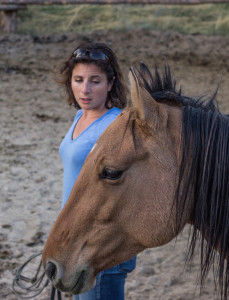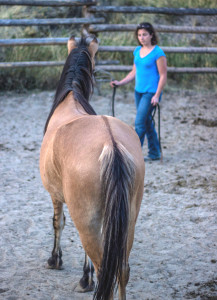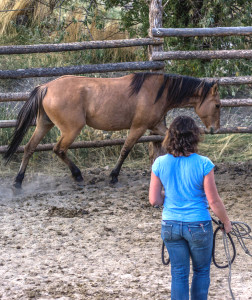Our piece on the Death of Natural Horsemanship was one of the most circulated pages ever for BestHorsePractices. It invigorated many lengthy online conversations on the state of today’s horsemanship, which brand of horsemanship is best, and what it all means.
 Absent in the conversation, of course, was the other animal in the equation, the horse.
Absent in the conversation, of course, was the other animal in the equation, the horse.
- What would the horse think of all the scuttlebutt?
- What would he think of those professing allegiance to one training method or another?
Horses likely don’t see any difference between a Parelli Carrot stick, a Clinton Anderson Handy stick, or a tree branch with a plastic bag tied on the end of it.
They don’t wince over your word selection or accent.
They care less what boots you’re wearing.
They do pay attention to how you use that stick.
They do hear what kind of emotion is put into your words.
They do care how you move in those boots.
In other words, the horses operate more like this: Let us not love with words or speech but with actions and in truth. 1 John 3:18
 You might consider returning the favor. Put down the books and DVDs, walk away from screen time, be quiet, and watch them.
You might consider returning the favor. Put down the books and DVDs, walk away from screen time, be quiet, and watch them.
— Watch them move in the field with herd mates.
— Watch how they behave in confined spaces or around you.
— Watch for their curiosity.
— Watch the micro-movements of their ears, eyes, and how they position their bodies vis a vis you.
Put yourself in their proverbial shoes and stop being human for a while. Or: Everyone should be quick to listen, slow to speak, and slow to become angry. James 1:19
As Dr. Temple Grandin wrote in Humane Livestock Handling:
Troubleshooting animal behavior is easier when you understand how animals think…Some adult humans think almost entirely in words. Their thoughts include very little visual imagery. Animals, however, think only in pictures, sounds, smells, touches, and tastes.
Verbal or word-based thinkers tend to overlook the sensory details that form an animal’s world. This becomes a problem when people handle animals based on their own needs and perceptions rather than on the needs and perceptions of the animals they handle.
 Dr. Carl Safina, author of Beyond Words: What Animals Think and Feel, says we need to distinguish horses as who, not what.
Dr. Carl Safina, author of Beyond Words: What Animals Think and Feel, says we need to distinguish horses as who, not what.
“Who” animals know who they are; they know who their family and friends are. They know their enemies. They make strategic alliances and cope with chronic rivalries…A vivid familiar life is not the domain of humans alone.
The lives of our equine partners is deeper and more complicated than we often appreciate. When we slice and dice their reality into neatly packaged portions, then marinate it in fancy jargon, the result is as removed from realness as a fast food burger from cattle on the range.
Seek knowledge, of course. But don’t forget that your best teacher may be waiting for you out in the paddock or field.
Read more about how research can enlighten your horse work.
Read more about Learning to Connect.
Read more about compassion and intelligence.
Outstanding article Maddy! If you take the time (and have the time) to watch your horses be horses, you understand that there’s a lot going on “up there”. I saw something that could only be compassion in a mare I owed for many years. She was being boarded and was in a small pasture with 20 or so other horses. I came through the gate with a halter to collect her and ride. Unknown to me, a puppy belonging to another boarder followed me out to pasture. I became aware of the puppy when my mare charged past me and intercepted the boss mare who was headed for the puppy from another direction to kill it. My mare drove the boss mare away and stood guard over the puppy until I could get there to pick up the dog. I wouldn’t have believed this cross-species compassion if I hadn’t seen it. My mare had never shown any special interest in dogs before and she didn’t afterwards. I read Carl Safina’s book last year in the Audible version, read by the author, and I also recommend it.
Best Horse Practices is THE best. Thank you for what you do for the horse and the human.